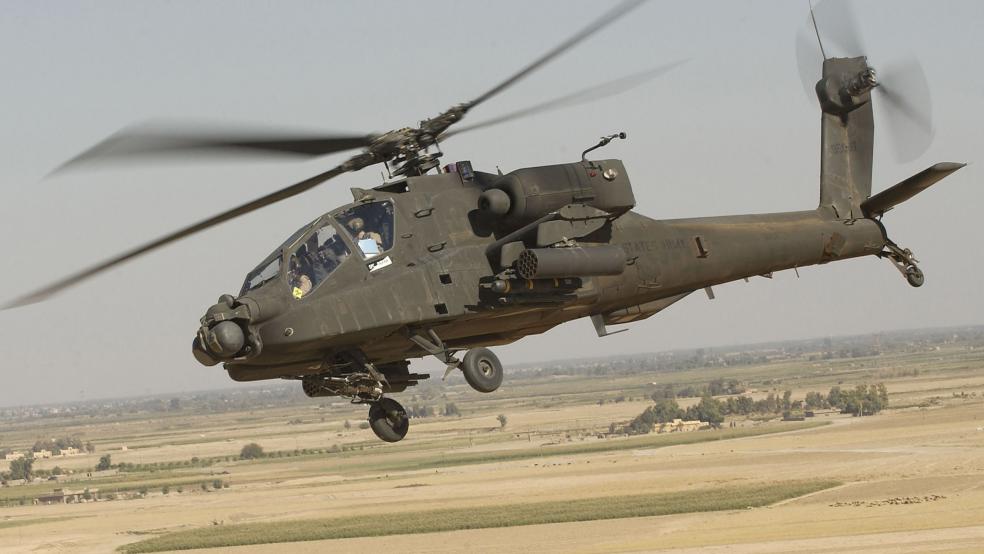At a time when President Obama has come under persistent criticism for having an inadequate strategy to win the war against Islamic extremists, the Defense Department is upping the ante in Iraq by turning loose a fleet of Apache attack helicopters.
“The United States is prepared to assist the Iraqi army with additional unique capabilities to help them finish the job, including attack helicopters and accompanying advisers if circumstances dictate and if requested by Prime Minister Abadi,” Defense Secretary Ash Carter said during a Senate Armed Services Committee hearing last week.
Related: Why the Air Force Is Requesting Billions More for Drones
The proposal comes as Iraqi government forces have struggled to retake the city of Ramadi from ISIS, which still controls large chunks of territory through the country.
American Apache helicopters have been in Iraq since last summer, but in a defensive posture to help protect the roughly 3,500 advisers in the Middle East state and the sprawling U.S. embassy, and guarantee access to Baghdad airport
That said, there’s precedent for putting the aircraft on offense; last fall Apache helicopters, which can reach speeds of roughly 175 miles per hour, assisted Iraqi soldiers fighting west of Baghdad.
Their use would open up a new capability in the air campaign against ISIS in Iraq. The helicopter, which costs around $52 million apiece, features a combination of laser-guided precision Hellfire missiles, 70mm rockets, and a 30mm automatic cannon with up to 1,200 ammunition rounds, according to fact sheet from Boeing, its manufacturer.
Related: McCain: We’re Not Paying for Anti-ISIS Program Unless There’s a Real Plan
Though the helicopters can fire their missiles from a distance, the aircraft could be at risk from ground fire when engaged in close combat situations, as happened during the previous U.S. military presence in Iraq. That raises the specter of American pilots being captured by ISIS or executed in graphic Internet videos like when the terror group put a Jordanian pilot in a cage and burned him alive.
Thus far, Baghdad has yet to take Washington up on its offer.
“If the Iraqi government asks for Apache helicopters, and the mission is right, if we agree, then we'll use” them, Col. Steve Warren, a spokesman for the military coalition, said during a Pentagon last week. The helicopters “are ready, so all we have to do is find an operation or a mission that they will be able to impact, and then agree with the Iraqis that it's the right time to use them.”
But the fact that the Pentagon is offering the helicopters at all marks an important moment in the roughly 16-month campaign against ISIS as it draws the U.S. closer to greater involvement in the region.
Related: ISIS Is Winning the Recruitment War as Foreign Fighters Flow into Syria
While President Obama has flatly refused to allow the country to be drawn into another open-ended commitment in the Middle East, polls show more Americans want boots on the ground to fight ISIS after the attacks in Paris and San Bernardino, California.
Offering the Apaches does move the U.S. “deeper” into the conflict, according to Lawrence Korb, a senior fellow at the Center for American Progress and former assistant secretary of Defense.
“The question becomes is it a small step that will lead to larger steps?” he asked. “What if it doesn’t work?”
Korb predicted that should the Apaches be used to take Ramadi, it would open up Pandora’s Box, with the Iraqi government wanting them to retake other population centers like Mosul, one of the country’s largest cities.
“It’s a very easy thing to do a little bit more and a little bit more,” he said.
Washington would need to reassess its commitment to using the helicopter if one of them is shot down, says one of the snipers ISIS is known for, according to Korb. But, based on the rhetoric he’s heard from officials in and out of government they are “willing to live with casualties.”
Putting the helicopters on offense “is a way for Carter to fend off some of the critics (on Capitol Hill) who say you’re not doing anything in response” to the recent ISIS attacks, he added.
Korb predicted the Apaches would be used, but might be accompanied by some kabuki theater, where Abadi “will play politics” and denounce the action. But, “we’ll do it and say it wasn’t that many, or it was limited or something.
The topic is sure to be up for discussion on Monday when Obama pays a visit to the Pentagon for a National Security Council meeting about the anti-ISIS strategy.
"He wants us to continue to come to him for proposals with ways that we can strengthen the campaign consistent with our overall strategic approach," Carter said during a joint press conference at the Pentagon with British Defense Secretary Michael Fallon.





